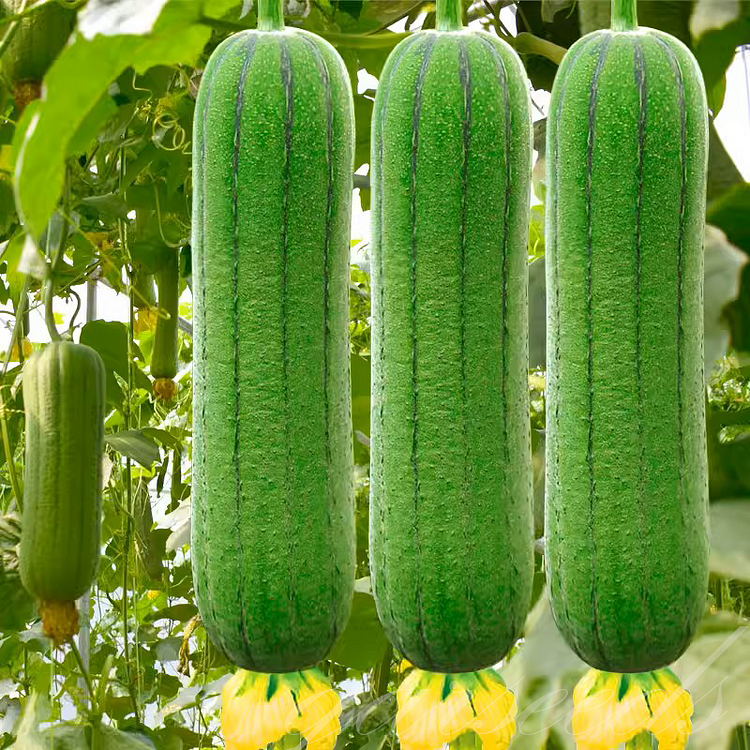Ridged Loofah Seeds
Couldn't load pickup availability
Description
Ridged Loofah Seeds produce a unique and versatile plant that is known for its long, ridged fruit. Often grown for its use as a natural sponge, the loofah (also spelled luffa) is a member of the cucumber family and has numerous culinary, decorative, and practical uses. The fruits of the loofah plant can be harvested at different stages, depending on whether you want to use them for cooking or for creating natural sponges once dried. These loofah vines are vigorous growers and thrive in warm climates, making them a favorite among gardeners seeking a unique and functional addition to their garden.
Why Choose Ridged Loofah Seeds?
- Multi-Use Crop: Loofahs can be harvested at different stages – young, tender loofahs are edible, while mature loofahs can be used as sponges or decorative items.
- Fast-Growing: Ridged Loofah plants grow quickly, producing fruit within a few months. This makes them a rewarding plant for gardeners who want a fast harvest.
- Natural Sponge: When fully matured and dried, the ridged loofah turns into a natural, eco-friendly sponge, perfect for cleaning and exfoliating.
- High Yield: These loofah plants are known for their vigorous growth and high yield, providing an abundance of loofah fruit per plant.
- Easy to Grow: Loofahs are relatively low-maintenance, making them a great choice for beginner gardeners who are looking to try something different in their garden.
How to Grow and Care for Ridged Loofah Seeds
Planting:
- When to Plant: Loofah seeds should be planted in late spring or early summer once the danger of frost has passed. They need warm soil to germinate and grow successfully.
- Spacing: Sow the seeds about 1 inch (2.5 cm) deep and space them 3-4 feet (90-120 cm) apart to allow the vines ample room to spread.
- Soil: Loofah plants prefer well-drained, fertile soil enriched with organic matter. They thrive in slightly acidic to neutral soil (pH 6.0-7.0).
- Sunlight: Loofah plants need full sun to grow strong and healthy. They require at least 6-8 hours of direct sunlight each day for optimal growth.
Growth Conditions:
- Watering: Keep the soil consistently moist but avoid waterlogging. Loofahs require regular watering, especially during dry spells, but ensure good drainage to prevent root rot.
- Temperature: Loofahs are heat-loving plants and grow best in warm temperatures between 75°F to 95°F (24°C-35°C). They are sensitive to frost, so ensure they are planted in a frost-free zone.
- Mulching: Apply mulch around the base of the plants to help retain moisture, control weeds, and keep the soil temperature stable.
Care:
- Fertilizing: Loofah plants benefit from regular feeding. Use a balanced fertilizer or compost to encourage strong growth and abundant fruit production.
- Pests and Diseases: Loofahs are relatively pest-resistant but may occasionally be affected by aphids, cucumber beetles, or powdery mildew. Use organic pest control methods as needed.
- Support: As a vining plant, loofahs need support to grow properly. Provide trellises or other structures for the vines to climb and spread, ensuring that the fruits don’t touch the ground, which helps prevent rot.
Harvesting:
- When to Harvest: Young loofahs can be harvested as vegetables when they are still tender and edible. For sponges, wait until the loofah is fully matured, usually after 3-4 months of growth, when it turns brown and the skin becomes thick and tough.
- Harvesting Technique: To harvest loofahs, cut them off the vine with a sharp knife or scissors. For edible loofahs, pick them early before the skin hardens, and for sponge use, wait until they are dry and brown.
- Preparing for Sponge Use: To turn a loofah into a natural sponge, peel off the outer skin and remove the seeds, then rinse and dry the interior fibers.
Benefits of Growing Ridged Loofah Seeds
- Edible and Practical: You can enjoy loofah fruit both as a delicious vegetable and as a natural sponge. The young, tender loofah can be cooked in stir-fries, soups, or grilled.
- Eco-Friendly Sponge: Once dried and processed, loofah sponges are 100% biodegradable and make an environmentally friendly alternative to synthetic sponges and scrubbers.
- Space-Efficient Vertical Gardening: Loofah plants grow vertically, making them perfect for small garden spaces or vertical gardening setups.
- High Yield and Quick Harvest: Ridged Loofah plants are prolific producers, offering a fast-growing crop with a high yield, making them a rewarding plant for gardeners.
- Low Maintenance: Once established, loofah plants require minimal care and are fairly resistant to pests and diseases, making them an excellent option for low-maintenance gardeners.
Ridged Loofah Seeds are an excellent choice for gardeners looking to grow a unique and multifunctional plant. Whether you're interested in harvesting edible loofah fruit or crafting natural sponges, these seeds offer an enjoyable and practical addition to your garden.





